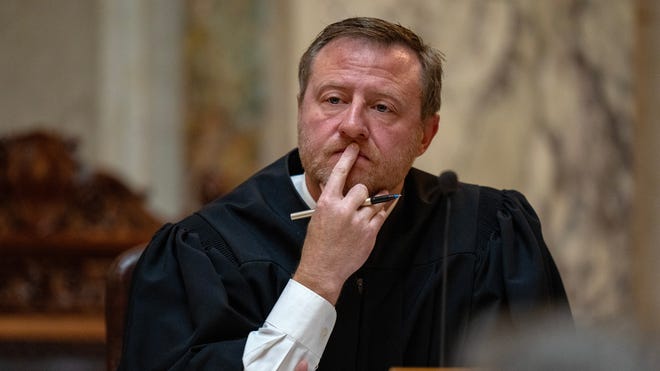On Thursday, Wisconsin Supreme Court Justice Brian Hagedorn recused himself from participating in the court’s consideration of a legal challenge to Act 10, the 2011 law that significantly restricted collective bargaining rights for public employees. Hagedorn, who played a key role in drafting and defending the legislation while serving as legal counsel to Republican Governor Scott Walker, decided to step aside from the case due to his prior involvement in its creation and defense.
The legal challenge emerged after a Dane County judge ruled in December that parts of Act 10 were unconstitutional. The judge found that the law’s differential treatment of certain state employees was unjustified, particularly in how it excluded specific groups of public safety employees—such as the Capitol Police, conservation wardens, and correctional officers—from collective bargaining rights, while maintaining those rights for other groups like police officers. This ruling prompted a teachers union to file a motion requesting that the Wisconsin Supreme Court bypass the Court of Appeals and hear the case directly. The Court responded to the motion on Thursday by granting Republican leaders of the state Legislature the right to intervene and submit a response by February 5.

Justice Hagedorn’s decision to recuse himself was based on ethical considerations. In his recusal order, Hagedorn acknowledged his past role in advising on the drafting of Act 10 and defending it in court, particularly in a federal case that raised similar constitutional concerns. He emphasized the importance of impartiality within the judiciary and expressed that, given his involvement in the law’s creation and defense, he was compelled to withdraw from the case. Hagedorn reaffirmed his commitment to impartiality, stating that judges must make decisions guided by law, not personal beliefs, politics, or outside influence.
This decision came amid growing scrutiny of justices’ involvement in politically sensitive cases. Justice Janet Protasiewicz, who had previously expressed concerns about potentially recusing herself due to her past involvement in protests against Act 10, did not participate in Thursday’s decision to accept the case but did not issue a formal recusal order either. Both Hagedorn and Protasiewicz had faced calls to recuse themselves due to their respective ties to the case and the political landscape surrounding it. Protasiewicz had also been threatened with impeachment by Republican lawmakers in a separate case concerning the state’s legislative maps.
Justice Hagedorn also issued a cautionary statement about the politicization of the recusal process. He stressed that recusal should be rare and should only occur when required by law, warning that excessive recusal could lead to the manipulation of the judicial process by parties seeking a litigation advantage.
In response to the Court’s order granting the Legislature’s request to intervene, Justices Rebecca Bradley and Chief Justice Annette Ziegler dissented. They, along with Hagedorn, had previously expressed concerns about the Court’s decision to take up cases without the lower courts’ input, especially after the 2023 shift in the Court’s majority from a conservative to a liberal bloc. In her dissent, Bradley pointed out that the state Legislature had requested a two-week extension to respond to the bypass petition but was instead given only three business days, which she criticized as a rushed decision. She suggested that the accelerated timeline might be politically motivated, aimed at revisiting settled law on a matter that the Court had already ruled on over a decade ago.
The ongoing dispute over Act 10 has become a significant issue in the upcoming April Supreme Court election. The case is expected to play a central role in the campaign between Dane County Judge Susan Crawford and Waukesha County Judge Brad Schimel, who was the state attorney general during Governor Walker’s second term.


Comments are closed, but trackbacks and pingbacks are open.